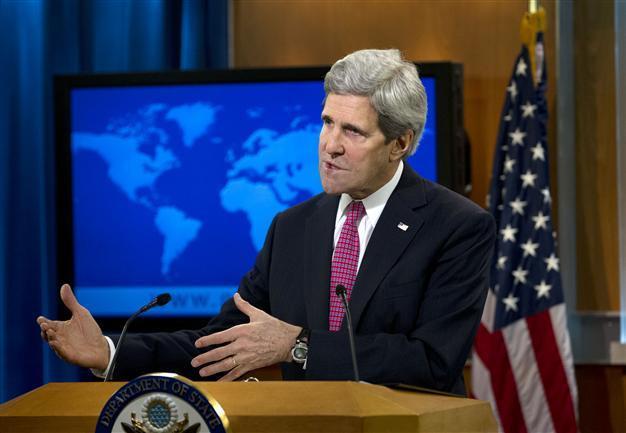US report warns Turkey over anti-corruption probe ‘scandal’
WASHINGTON – Hürriyet Daily News

AP Photo
The U.S. has said Turkey’s judicial system is “politicized and overburdened” and described the recent corruption probe and subsequent developments as a “scandal,” in its annual Human Rights report about Turkey.“The judicial system was politicized and overburdened. Authorities continued to engage in arbitrary arrests, hold detainees for lengthy and indefinite periods in pretrial detention, and conduct extended trials,” the State Department said in its Human Rights report for 2013.
“The law enforcement and the judiciary were subject to executive branch influence as the government reassigned thousands of police and prosecutors during the Dec. 17 anti-corruption operation and subsequent scandal,” the report on Turkey particularly noted.
A massive graft probe launched Dec. 17, 2013 has shaken Turkey, with the sons of three ministers detained along with a number of bureaucrats and businessmen. Since the scandal broke, the government has removed hundreds of prosecutors, judges and police officers involved in the investigations regarding alleged money laundering, gold smuggling and bribery. Public prosecutor Muammar Akkaş attempted to launch a second probe on Dec. 25, ordering the arrests of 41 people on similar charges, but these detentions were not carried out.
The 51-page report added that many suspects in the probe have family and/or business ties to the ruling Justice and Development Party’s (AKP) top echelons, including three ministers’ sons, CEOs, and other prominent officials.
“Authorities have not established a pattern of investigating, indicting, and convicting individuals accused of corruption and there were concerns about the impartiality of the judiciary in handling the anticorruption cases,” it stated, while also underlining the lack of laws to protect whistleblowers in such investigations.
The U.S. Department of State also criticized the Turkish police’s misconduct in last year’s Gezi Park protests.
“Authorities used excessive force to disperse protests, detained thousands of persons, including many journalists, academics, lawyers, and students during the demonstrations and charged many under the anti-terror law. Of particular note, authorities used excessive force in response to the summer’s Gezi Park protests, leading to mass casualties [including seven deaths] and an overall diminution of freedom of expression and press,” the report noted.
Six people and one police chief were killed in last year’s Gezi protests across several cities.
Turkey’s anti-terror law was another item agenda in the report that was identified as restricting freedom of expression, the media, and the Internet. “Authorities imprisoned scores of journalists who remained incarcerated at the year’s end, most charged under the anti-terror law or for connections to an illegal organization,” said the report, adding that self-censorship is common because of the fear that criticizing the state or government publicly could result in civil or criminal suits or investigations.
The report also criticized the government for harassing and prosecuting persons sympathetic to some religious, political, and Kurdish nationalist or cultural viewpoints. It said the government failed to effectively protect vulnerable sections of society such as women, children and LGBT individuals against discrimination.
“The government did not effectively protect vulnerable members of the population, including: women, children, lesbian, gay, bisexual, and transgender (LGBT) individuals, from societal abuse, discrimination, and violence,” the report said.
Violence against women, including so-called “honor killings,” remain a considerable problem, and child marriage persists, it also noted.
















